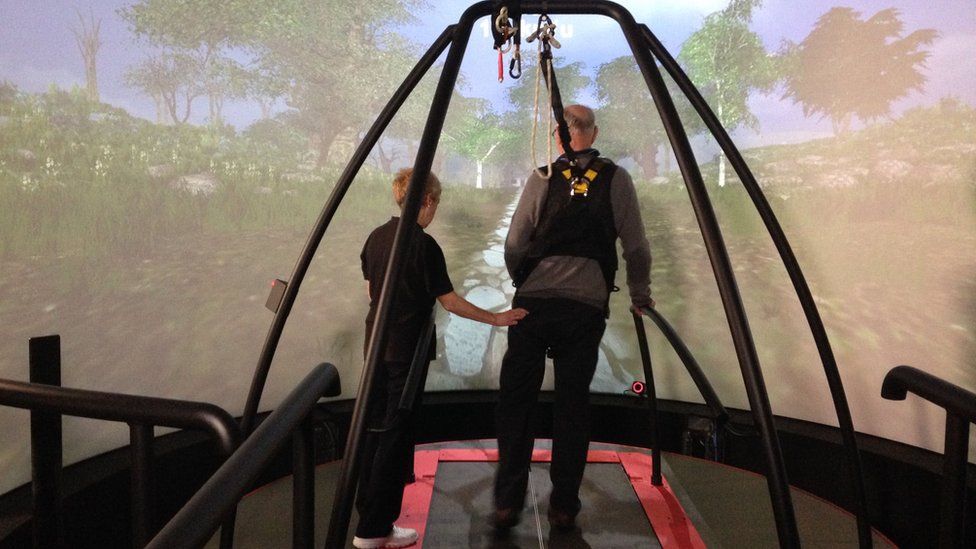Virtual reality puts patients on the road to recovery
- Published

Recovering mobility after a stroke or an accident can take a lot of hard work. Now a team in Manchester is using virtual reality to help patients get moving again.
Marge Brown cannot help the tears welling up in her eyes as she watches her husband stroll on a treadmill through a virtual wood he can see on the giant video screen in front of him.
Six years ago, Kenneth had a massive stroke which left his left side paralysed. Doctors told him he would never be able to walk again and advised he would be best cared for in a residential home.
"Now look at him!" says Marge with pride. "This morning he's already been sailing and now he's walking in the woods!"
Instead of accepting his doctor's advice, Kenneth stepped up his rehabilitation programme and got a referral to BASIC, the Brain and Spinal Injury Centre which is a charity based in Salford and which is affiliated to the Greater Manchester Clinical Neuroscience Centre at Salford Royal Hospital.
Kenneth was particularly keen to try BASIC's recently installed computer assisted rehabilitation environment system known as Caren, which aims to help people like him win back movement, balance and confidence.
'Funfair gimmick?'
Under the careful guidance of neuro-physiotherapist Sylvia Moss, Kenneth is strapped into a harness, and led to circular podium on a rotating chassis where he stands on the treadmill facing a cinema sized wrap-around screen.
The prow of a boat appears before him on the screen and Sylvia explains to him that he's going to feel as if he's driving that boat and that he will need to transfer his weight to move the boat around an obstacle course and that he must lean forward when he wants to pick up speed. The sound of seagulls fills the room.
"Shall we have a few sharks Ken?" asks Sylvia as the programme starts. Kenneth brightens instantly. "Oh lovely!" he says gamely. "Bring on the sharks!"
Caren might sound like an expensive funfair gimmick - it cost BASIC around £500,000 to purchase and install - but its results are promising.
Sylvia Moss says it isn't a replacement for basic physiotherapy - but it is an extremely useful additional aid.
"The Caren is able to do multifactorial things. It's able to do walking, balance, cognition and visual field as well so it enables multi-tasking.
"Many stroke patients or Parkinson's or dementia sufferers do have problems multi-tasking so this system is really good value.
"And it's safe. Ken knows he won't fall so he's more likely to push himself; in fact many patients come in determined to beat their last score so the challenge is there for them too."
Kenneth wants to try "skiing" next time which will force him to push his weight forward and use his paralysed leg.
"It's good fun," he smiles as his wife helps him into his coat. "I've had several falls since my stroke and while the gym builds muscle, the Caren builds confidence."
'Wrapped in cotton wool'
It was BASIC's chief executive, Wendy Edge, who first heard about the system.
She learnt that the Israeli army was using a virtual reality system to help rehabilitate injured soldiers and went to visit their brain and spinal injury hospital in Tel Aviv to see for herself.
"The research showed that using virtual reality as part of a rehabilitation process actually speeds up recovery and can reduce the impact of a brain injury, so we set about fundraising immediately."
BASIC is already conducting its own physical, cognitive and psychometric tests before and after Caren sessions, which Wendy Edge says show positive results.
Patient feedback forms wax lyrical about the "fun" of the system.
Last month BASIC also secured funding to launch a pilot project which will allow 30 people with mild to moderate forms of dementia to try the Caren system. Wendy Edge says the problem with dementia patients is they are too often "wrapped up in cotto wool," and end up isolated and dependent.
"The Caren gives people with dementia the chance to do the things they used to do in the outside world. They can be safely immersed in this futuristic world and enjoy football, exploring a castle, skiing - things they would never get the chance to do."
Driving is something else which becomes possible again with the Caren.
After a recent stroke and the diagnosis of mild dementia, Leslie is no longer allowed to drive but at least using the Caren he can still get the sensation of being on the road while concentrating on avoiding obstacles and controlling his speed through his balance.
"It's a bit exaggerated," he admits "I wouldn't drive like that on a real road - but I'm glad it isn't a real road as I had a few bad crashes today."
"I miss driving, but this gets me out of the house and it loosens me up a bit and I do look forward to coming here - I love it really."
In the waiting room grinning with excitement is 17-year-old Sophie Downes. She has been using the Caren system for a few months following a stroke which left her with weakness on her right side.
"It's like being in a film," she says "It's like really amazing! Yesterday I was really good on it and it makes me use my body a lot. My right arm has really improved."
But does it feel like she's living in a video game?
"It's better than that," she says. "It feels like real life."
- Published9 June 2015
- Published24 September 2015
- Published26 March 2016